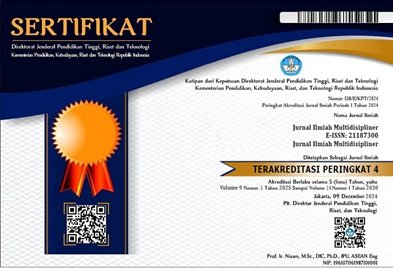HUBUNGAN KONTROL DIRI DENGAN FEAR OF MISSING OUT (FoMO) PADA IBU RUMAH TANGGA PENGGUNA MEDIA SOSIAL FACEBOOK DI KELURAHAN BELAWAN BAHAGIA
Kata Kunci:
Kontrol Diri, Fear Of Missing Out, Ibu Rumah TanggaAbstrak
Penelitian ini bertujuan untuk melihat hubungan kontrol diri dengan Fear Of Missing Out (FoMO). Penelitian ini menggunakan metode penelitian Kuantitatif. pengambilan teknik sampelnya menggunakan Teknik Purposive Sampling dengan jumlah sampel 50 orang. Menggunakan model skala guttman, melalui skala kontrol diri dan skala Fear Of Missing Out (FoMO). analisis ini menggunakan teknik Kolmogorov Smirnov dengan bantuan program komputer SPSS versi 22.0 for windows Teknik analisis data yang digunakan adalah korelasi Product Moment dari Karl Pearson. Hasil penelitian ini menunjukkan koefisien korelasi (rxy) sebesar = - 0,563 dengan nilai signifikan p= 0,004 < 0,050. Hal ini berarti hipotesis penelitian diterima, yakni adanya hubungan negatif yang signifikan antara kontrol diri dengan Fear Of Missing Out (FoMO). Berdasarkan hasil perhitungan secara nilai rata-rata hipotetik dan empirik kontrol diri tergolong rendah, sebab dilihat dari perbandingan rata-rata empirik (30,00) sedangkan nilai rata- rata hipotetiknya (34,5). Kemudian Fear Of Missing Out (FoMO) tergolong tinggi, sebab dilihat dari perbandingan rata-rata empirik (33,84) sedangkan nilai rata-rata hipotetiknya (27). Adapun sumbangan efektif dari control diri mempengaruhi Fear Of Missing Out (FoMO) sebesar 31,6%. Adapun faktor lainnya yang tidak diteliti dalam penelitian ini sebesar 68,4% yakni; berasal dari faktor kebutuhan psikologis self yang tidak terpenuhi, Psychological Need Satisfaction dan tidak terpenuhinya kebutuhan psikologis relatedness individu.
This research aims to see the correlation between self-control and Fear Of Missing Out (FoMO). This research uses quantitative research methods. The sampling technique used purposive sampling technique with a total of 50 people. Using the Guttman scale technique, namely the self-control scale and the Fear Of Missing Out (FoMO) scale. This analysis uses the Kolmogorov Smirnov technique with the help of the computer program SPSS version 21.0 for windows. The data analysis technique used is Product Moment correlation from Karl Pearson. The results of this study show a correlation coefficient (rxy) of = - 0.563 with a significant value of p = 0.004 < 0.050. This means that the research hypothesis is accepted, namely that there is a significant negative correlation between self- control and Fear Of Missing Out (FoMO). Based on the calculation results, the average hypothetical and empirical self-control values are low, because it is seenfrom the comparison of the empirical average (30.00) while the average hypothetical value is (34.5). Then the Fear Of Missing Out (FoMO) is high, because it is seen from the comparison of the empirical average (33.84) while the average hypothetical value is (27). The effective contribution of self-control influences fearof missing out (FoMO) by 31.6%. The other factors not examined in this study amounted to 68.4%, namely; comes from the factor of unfulfilled self psychological needs, Psychological Need Satisfaction and unfulfilled relatedness psychological needs of individuals.





